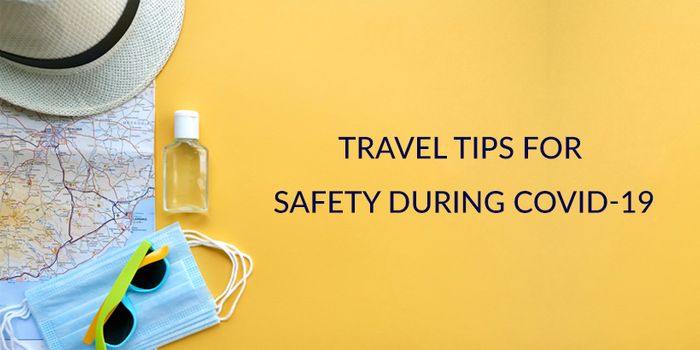How To Travel Safely During COVID-19
Travelling during COVID-19 may seem a bit daunting. Learn about how to protect yourself and keep safe and healthy wherever you go by following these simple tips...
COVID-19 vaccines have made travelling during the pandemic safer, but there are still some precautions that we need to take. Travel restrictions are easing, people are getting used to the new normal, and are quite ready to explore new destinations. Travelling during the pandemic is quite different from what we were once used to. It requires a detailed and cautious approach to minimize the risks. It is vital that people regularly update themselves with the latest covid-19 restrictions. Here are a few important tips on how to travel safely during this pandemic.
Assess the COVID-19 rate at your destination
It is important to consider the infection rate of where you live and the destination you’re planning to travel to. When there is a community spread, there is a higher risk of getting infected with COVID-19. If you’re heading to place that’s red hot with infection, you could get sick during your trip and bring it back to your loved ones even if you’re vaccinated. Therefore, it is better to avoid going to a place that tops the red list of COVID-19 cases, as the last thing you need is becoming ill on vacation!
Get to know about the restrictions
It is a good idea to find out about the restrictions implemented by the administration of the destination where you’re planning to travel. There might be local rules and restrictions on activities that may differ from where you’re travelling from. So, it’s better to research beforehand and check whether all the tourist places or local bars and restaurants are open.
Plan ahead when testing around your trip
It is essential to plan your travel in advance as there is still a lot of confusion regarding the tests needed for travelling. Depending on the destination, a person might require a PCR or Antigen test and some even accept fully vaccinated passengers without any tests or quarantine. Some international destinations require these PCR or Antigen tests even if you’ve been vaccinated. Visit your chosen travel destination’s official government / tourism website to find about its Covid-19 travel protocols and test requirements which in turn will allow you to plan your tests ahead of time, reducing anxiety and saving money.
Make a list of essential items to carry
Plan and organize well in advance to avoid last-minute hassles. Do not forget to pack your sanitizer, handwash, face masks, disinfectant spray, and wipes. If you’re taking a flight, you could even invest in a set of disposable seat covers and a travel pillow to prevent infection. For short flights, you can use disinfectant sprays to avoid contamination. Always wear an FDA-approved N-95 mask while travelling as these masks block 95% of particles, keeping you safe and protected.
Choose your mode of travel wisely
Driving is the safest option for transportation for those who aren’t vaccinated or are at a high risk of severe COVID-19, if the destination isn’t too far and can be reached in a day. It limits interactions with other people and keeps you safe from the virus. Flying is another relatively safe choice. You need to wear a N-95 mask at all times during the flight, especially when other nearby passengers remove their masks to eat or drink. It is extremely important to get fully vaccinated for protection from severe COVID-19. Vaccinated people can take any form of transportation but always wear masks to keep yourself safe even from mild infection.
Avoid crowded indoor spaces
Experts advise avoiding indoor spaces crammed with people whose vaccination status are unknown. It might be legal to visit enclosed public spaces like bars and restaurants at the destination where you’re planning to travel, but it carries a significant amount of risk of contracting the disease. It is wise to skip visiting these places for now. If you are vaccinated, your chances of getting serious illness are much lower but a small risk is still there.
Follow these easy tips to stay safe from COVID-19 during your travels and you're good to go!





